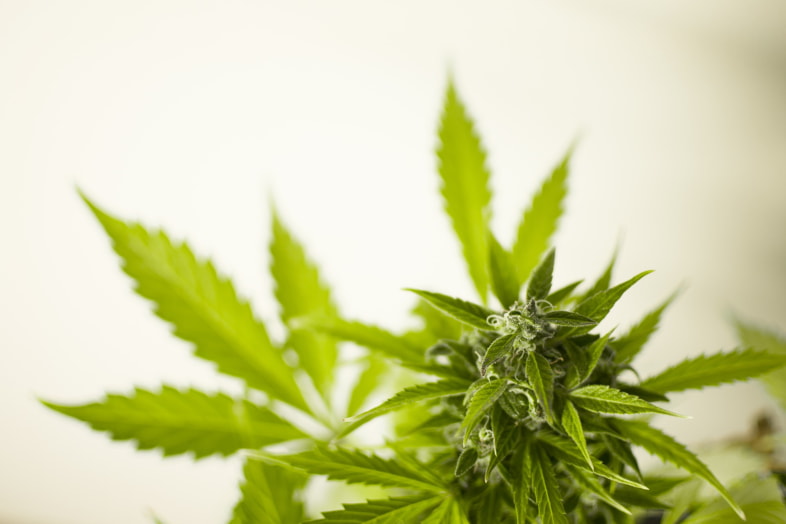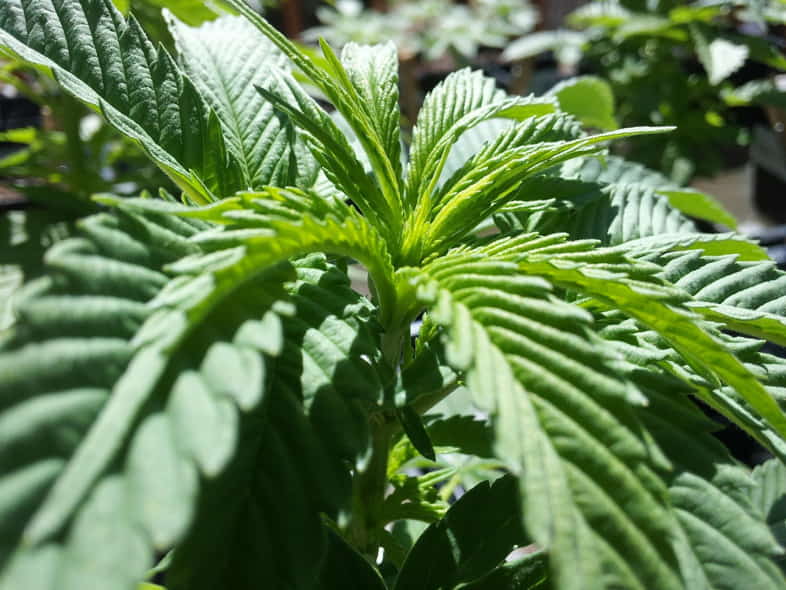Modified on: 28/11/2024
THE LATEST CANNABINOID DISCOVERED: THCV. HOW DOES IT BEHAVE?
Recently, medical cannabis products, among which: CBD hash, CBD oil, have been enjoying increasing success, prompting a great deal of interest from the scientific community.
Despite the substantial prejudice surrounding cannabis, this plant never ceases to amaze us and seems unwilling to settle for the label of a narcotic substance. Indeed, in addition to the well-known psychoactive properties, it can be arousing in those who take it. Moreover, it seems to have therapeutic potential that is increasingly the focus of heated debate.
The latest research on marijuana and its components has led to discovery of an additional active ingredient, tetrahydrocannabivarin, with multiple properties.
In this article, I want to tell you about this new cannabinoid (THCV) and its interactions with our organisms.
Read also: Hemp fuel: is it a real option for the future of the green economy?
Tetrahydrocannabivarin: what is it?
As I mentioned, tetrahydrocannabivarin is part of the huge family of cannabinoids contained in marijuana.
The similarity of its acronym, THCV, with the well-known THC is no coincidence. The two molecules are very similar in structure. However, the same cannot be said of how they interact with the endocannabinoid system.
Let’s look at how tetrahydrocannabivarin behaves once taken up by the body.
Generally speaking, the cannabinoids present in cannabis and hashish – at least as far as the two best known are concerned, CBD and THC – stimulate the reaction of the two receptors CB1 and CB2, in a more or less intense manner on the quantities taken.
THCV, on the other hand, is not quite the same. So we can safely say that this cannabinoid also interacts with the receptors but in a distinct way.
The main difference is that tetrahydrocannabivarin can elicit reactions of a different nature, depending on the quantities taken.
To be even more precise, its effects change depending on the amount put into circulation.
At lower dosages, tetrahydrocannabivarin acts by antagonising CB1 and CB2, effectively attenuating the psychotropic effects of THC. It, therefore, lessens the so-called ‘high’ feeling in common with CBD.
With increasing doses, however, the action of THCV is anything but mitigating the drugging effect. In larger quantities, it, in turn, manifests psychotropic properties, contributing to the typical euphoric state that follows the consumption of cannabis. Under these conditions, THCV puts into action an opposite mechanism to the previous one: it activates the CB1 receptor.
We would not be making a mistake if we were to think of tetrahydrocannabivarin as a cannabinoid that, in a sense, harbours the main characteristics of its two better-known cousins, CBD and THC, resembling one or the other depending on the amount released into the body.
Let’s look at the main differences between THC and THCV in more detail.

What are the differences between tetrahydrocannabinol and tetrahydrocannabivarin?
Chemically speaking, these two elements have a lot in common. The two molecules have a strikingly similar structure.
However, we begin to see the differences by changing perspective and moving on to the effects of thc is generated by these two substances.
Although, as we have anticipated, THCV is capable of exerting the so-called drugging effect typical of marijuana when taken in large doses, it appears that the high is not the same as that induced by THC.
Tetrahydrocannabivarin appears to cause an intense and stimulating effect, but one that is also more lucid and less long-lasting than that caused by THC.
Another aspect that these two very similar molecules do not share concerns their relationship with the stimulation of appetite: THCV appears to inhibit it, unlike THC and the well-known chemical hunger it induces. This aspect seems to be exploited in the management of weight regulation.
Here, then, is a beneficial property of tetrahydrocannabivarin. But is it the only one? Let’s find out together.
Read also: Legal cannabis with more CBD: here is Justbob selection
Exploring the Therapeutic Potential of Tetrahydrocannabivarin (THCV)
Tetrahydrocannabivarin (THCV) is a lesser-known cannabinoid found in Cannabis sativa, and recent research has shed light on its potential therapeutic applications. THCV is distinct from its more well-known counterpart, tetrahydrocannabinol (THC), in terms of its effects and molecular targets. This article aims to explore the various studies and findings related to the potential uses of THCV.
Insulin Sensitivity and Glucose Metabolism:
Studies conducted on mouse models and healthy male human volunteers have suggested that THCV may have a role in ameliorating insulin sensitivity and improving glucose metabolism. A randomized double-blind placebo-controlled crossover pilot trial revealed decreased fasting plasma glucose levels in participants who received THCV compared to those who received a placebo. This indicates potential benefits for individuals dealing with glucose intolerance and insulin resistance.
Anti-Inflammatory and Antipsychotic Effects:
Research has also explored the anti-inflammatory and antipsychotic effects of THCV. In rodent models, THCV demonstrated the ability to decrease signs of inflammation and produce antipsychotic effects. These findings suggest a potential role for THCV in conditions involving inflammatory responses and mental health disorders.
Weight Management:
THCV’s influence on body weight and energy metabolism has been investigated, with some studies indicating that it may lead to weight loss and increased energy expenditure. In two mouse models of obesity, THCV treatment resulted in decreased body weight gain, suggesting a potential therapeutic effect in addressing conditions related to weight management.
Neurological and Neural Effects:
THCV’s impact on the central nervous system has been a subject of interest. Research on rodent models and human volunteers has suggested that THCV may have beneficial effects on neural function. Additionally, studies have explored its potential in mitigating depressive episodes, making it a candidate for further investigation in mental health treatments.
Endocannabinoid System and Molecular Targets:
THCV interacts with the endocannabinoid system, specifically cannabinoid receptors. Unlike THC, THCV acts as a partial agonist, binding to different molecular targets within the endocannabinoid system. This unique interaction may contribute to its diverse physiological effects, ranging from improved glucose tolerance to potential neuroprotective properties.
While the research on THCV is still in its early stages, the findings so far indicate promising potential for therapeutic applications. From its role in improving insulin sensitivity and glucose metabolism to its anti-inflammatory and antipsychotic effects, THCV presents itself as a multifaceted cannabinoid with diverse benefits. As further studies unfold, THCV could become a valuable component in the development of treatments for conditions such as metabolic syndrome, neurological disorders, and mental health issues. However, it’s essential to note that more comprehensive clinical trials are needed to establish the efficacy and safety of THCV in various medical contexts.
Does tetrahydrocannabivarin have beneficial properties? What are they?
It is hardly news that cannabis and its components are rich in beneficial properties. And guess what? Tetrahydrocannabivarin is no different.
As I told you, its ability to inhibit appetite is already known, but it is certainly not the only one.
THCV proves to be on a par with its predecessors, THC and CBD, displaying pronounced anti-convulsive, anti-inflammatory and neurodegenerative properties, known for CBD weed.
But how?
The issue of weight loss is directly attributable to the inhibitory action of the CB1 receptor, which is responsible for the sense of appetite.
This makes THCV a potential ally in the treatment of various eating disorders. In addition, according to recent research, an increase in energy expenditure has also been observed in mice administered THCV, resulting in weight loss.
But tetrahydrocannabivarin’s potential does not end there.
There is speculation that it is also effective against epilepsy, given its anticonvulsant properties.
According to a study on a sample of adult rats, suffering from a particular form of epilepsy published in the journal Epilepsia, the molecule seems to have particularly beneficial effects in treating states of hyperexcitation.
According to other studies, THCV administration also stimulated the inflammation of the hind legs of several rat specimens, visibly reducing swelling and perceived pain.
Finally, we also mention the inhibiting effect on neurodegenerative processes underlying many diseases, such as Parkinson’s disease. According to further research, administration of the molecule in mice suffering from this very disorder resulted in a marked improvement in symptoms and a significant slowing of the disease’s progression.
In addition, a pronounced decrease signs antioxidant action is shown.
As you may have noticed, the studies carried out so far are encouraging, although similar research on human subjects has not yet been completed.

Exploring the Safety of Trying Tetrahydrocannabivarin (THCV): A Comprehensive Review
Tetrahydrocannabivarin (THCV) has emerged as a subject of interest in the realm of cannabinoid research, raising questions about its safety and potential benefits. This text aims to provide an overview of existing studies and evidence to address concerns surrounding the safety of trying THCV.
Clinical Trials and Human Studies:
Several studies, including randomized double-blind placebo-controlled trials, have explored the safety and physiological effects of THCV in human healthy volunteers only. Trials such as those conducted by Thomas et al and Englund et al have investigated its impact on glycemic and lipid parameters, insulin sensitivity, and neural effects. These studies, involving healthy male human volunteers, provide valuable insights into the safety profile of THCV.
Metabolic Effects and Insulin Sensitivity:
THCV’s potential therapeutic metabolic effects, particularly in ameliorating insulin sensitivity and lipid metabolism, have been highlighted in various research endeavors. Englund et al’s crossover pilot trial demonstrated a potential role in restoring insulin sensitivity, suggesting a positive impact on metabolic health.
Neurological and Psychiatric Effects:
Studies involving mouse models and human volunteers have explored THCV’s effects on neural and psychiatric conditions. The cannabinoid has shown promise in producing antipsychotic effects, making it a potential avenue for research in mental health treatments. Additionally, its impact on food reward and the endocannabinoid system in relation to neural effects has been studied in depth.
Inflammatory Response and Safety Concerns:
Safety concerns often arise in the context of cannabinoid use, especially in relation to the inflammatory response and peripheral nervous systems. Existing research, including studies by Di Marzo et al and Riedel et al, suggests that THCV may modulate these systems without causing adverse effects.
Consideration of THC-Induced Cognitive Effects:
Given its close association with THC (tetrahydrocannabinol), concerns about psychoactive effects may arise. However, studies have indicated that THCV’s effects differ from those induced by THC. Its unique molecular targets and naturally occurring analogs contribute to a distinct profile that may mitigate potential cognitive effects.
While the safety of trying THCV is a nuanced topic, current evidence from clinical trials and preclinical studies suggests a favorable safety profile. The cannabinoid’s potential therapeutic benefits in metabolic health, neural effects, and inflammatory response modulation make it a subject of continued exploration. However, it is crucial to emphasize the need for further research and comprehensive clinical trials to establish a clear understanding of THCV’s safety, efficacy, and potential applications. Individuals considering trying THCV should consult healthcare professionals to make informed decisions based on their specific health conditions and concerns.
Impact on Glycemic and Lipid Parameters”
Tetrahydrocannabivarin (THCV), a lesser-known cannabinoid derived from Cannabis sativa, has become the subject of scientific exploration, particularly regarding its potential impact on glycemic and lipid parameters. This comprehensive review delves into key findings from various studies, including a parallel group pilot study, shedding light on THCV’s effects on metabolic health.
THCV and Glycemic Parameters:
Research, including the parallel group pilot study conducted by Thomas et al, has investigated THCV’s influence on glycemic parameters. By examining plasma glucose levels and its impact on insulin sensitivity, these studies provide valuable insights into the potential therapeutic effects of THCV in managing conditions related to glucose metabolism.
Lipid Metabolism and Lipid Parameters:
THCV’s role in lipid metabolism is another focal point of this exploration. By examining its effects on lipid parameters and intracellular lipid levels, we aim to understand how THCV may contribute to maintaining healthy lipid profiles and overall metabolic balance.
THCV and Potential Therapeutic Metabolic Effects:
Beyond glycemic and lipid parameters, studies suggest that THCV may have therapeutic metabolic effects. The cannabinoid’s impact on endocannabinoid metabolic enzymes and signaling pathways is explored, offering a more comprehensive understanding of its potential benefits.
Other Aspects of THCV Exploration:
This review also delves into various aspects of THCV research, including its effects on inflammatory pain, antipsychotic properties, and its modulation of cannabinoid receptors. Additionally, its influence on food reward, cognitive effects, and the broader impact on energy homeostasis are discussed.
Considerations for Further Research:
As with any emerging area of study, the need for further research is emphasized. The discussion encompasses the exploration of minor cannabinoids, cannabinoid-enriched cannabis extracts, and the potential application of THCV in conditions such as multiple sclerosis, obesity in mouse models of obesity, and its impact on anti-cancer properties.
How Tetrahydrocannabivarin Ameliorates Insulin Sensitivity
Tetrahydrocannabivarin (THCV), a lesser-explored cannabinoid derived from Cannabis sativa, is emerging as a potential therapeutic agent with a focus on improving insulin sensitivity. This text delves into key findings from various studies, including a parallel group pilot study, shedding light on THCV’s ability to positively impact insulin sensitivity and contribute to overall metabolic health.
Insulin Sensitivity and THCV:
Research, including the parallel group pilot study, has indicated that THCV possesses the capacity to ameliorate insulin sensitivity. By exploring its effects on insulin sensitivity in both placebo-controlled studies and vivo experiments, this text aims to highlight the therapeutic potential of THCV in managing conditions related to glucose metabolism.
Metabolic Impact on Glucose and Lipid Metabolism:
Beyond its influence on insulin sensitivity, THCV’s impact on lipid and glucose metabolism is discussed. Studies examining plasma glucose levels and the modulation of cannabinoid receptors provide insights into THCV’s multifaceted role in maintaining a balanced metabolic profile.
Antipsychotic Effects and Beyond:
While primarily focused on metabolic health, THCV has demonstrated diverse effects, including potential antipsychotic properties. This section explores the broader spectrum of THCV’s physiological impact, encompassing its role in mitigating inflammatory pain, transient receptor potential modulation, and its effects in mouse models.
Clinical Studies and Placebo-Controlled Trials:
The text emphasizes the importance of clinical research, referencing double-blind placebo-controlled trials involving healthy volunteers and adult rats. These studies contribute valuable insights into the safety and efficacy of THCV, supporting its potential application as a therapeutic metabolic agent.
Consideration of Minor Cannabinoids and Further Research:
In addition to THCV, the discussion extends to minor cannabinoids and the need for further research. The exploration therapeutic metabolic effect of naturally occurring analogs, such as THCV, provides a foundation for understanding the broader spectrum of cannabinoids and their effects on metabolic health.
So, in conclusion, what are the effects of tetrahydrocannabivarin on the body?
The discovery of this additional cannabinoid, tetrahydrocannabivarin, again highlights beneficial properties attributable to cannabis and its components.
In particular, researchers have observed how this substance can change its action on CB1 and CB2 receptors depending on the size of the dose in circulation.
If, in fact, at high doses, it behaves similarly to the well-known THC, in smaller quantities, it appears to share the inhibitory function hitherto attributed only to CBD.
The studies conducted on THCV are still limited to observing the effects induced in mice. Still, there is no lack of grounds for believing that tetrahydrocannabivarin can also make a difference in humans.
If you want to learn more about the world of CBD cannabis, I recommend you to have a look to our Justbob portal, a leader in the sale of collectable cannabis, such as CBD hash, CBD flowers and CBD oil.
We are waiting for you in our CBD flower shop!





